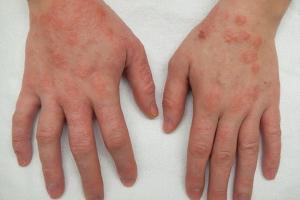ECZEMA-INTRODUCTION,SIGN&SYMPTOMS,TREATMENT AND HOME REMEDIES

Eczema is termed “the itch that rashes,†since scratching normally precedes the rash.it is also called atopic dermatitis.
As per Ayurveda eczema, it can be broadly associated with vicharchika.An itchy inflammation of the skin.Atopic dermatitis usually develops in early childhood and is more common in people who have a family history of the condition.
According to charak samhita it is a condition where the skin has red rashes,with bumps,associated with profuse discharge,intense itching and often blue discoloration.some other also notify painful,dry and mild to moderate itching lesions.explantions of blackish lesions with severe itching and watery discharge over the skin are also available in classical versions.
Eczema affects males and females equally and is more common in people who have a personal or family history of asthma, environmental allergies and/or food allergies.
It typically starts during infancy or early childhood and can persist into adulthood. However, eczema can occur in people of any age.Eczema doesn’t harm your body. It doesn’t mean that your skin is dirty or infected, and it’s not contagious.
Atopic dermatitis is the most severe and chronic (long-lasting) form of eczema. It's characterized by inflamed skin that may crack and release a clear fluid when scratched (an effect known as weeping).
CAUSES-
The cause of eczema is unknown. It is likely caused by both genetic and environmental factors. it’s triggered by an overactive immune system.Eczema (atopic dermatitis) is caused by a combination of immune system activation, genetics, environmental triggers and stress. Your immune system. If you have eczema, your immune system overreacts to small irritants or allergens. This overreaction can inflame your skin.
Eczema triggers-
An eczema flare-up happens when one or more eczema symptoms appear on the skin. According to the National Health Service (NHS), research has shown that external and internal factors can contribute to flares of eczema. Common triggers include:
ï‚·chemicals or preservatives found in cleansers and detergents
ï‚·scented products
ï‚·cigarette smoke
ï‚·external allergens such as pollens, mold, dust, or dust mites
ï‚·rough scratchy material, like wool
ï‚·synthetic fabrics
ï‚·sweating
ï‚·temperature changes
ï‚·stress
ï‚·food allergies
ï‚·animal dander
ï‚·upper respiratory infections
SIGN&SYMPTOMS-
The first signs of eczema are itchiness and redness.
The main symptom of eczema is itchy, dry, rough, flaky, inflamed, and irritated skin.
Eczema can show up anywhere on your skin. In teens and adults, it’s typically found on your hands, neck, inner elbows, ankles, knees, feet and around your eyes.
It can flare up, subside, and then flare up again.
Other symptoms include:-
ï‚·intense itching
ï‚·red or brownish-gray patches
ï‚·small, raised bumps that ooze fluid when scratched
ï‚·crusty patches of dried yellowish ooze, which can signal infection
ï‚·thickened, scaly skin
ï‚·sore or raw-feeling skin
Many people find their symptoms get worse at night, making it difficult to sleep. Scratching eczema further irritates and inflames the skin. This can cause infections that must be treated with antibiotics.
Sometimes, mild eczema can be managed at home by avoiding triggers and keeping skin moisturized. However, it’s best to see a doctor when symptoms are hard to manage or are getting worse. It’s a good idea to make a medical appointment if your:
eczema isn’t responding to over-the-counter treatments
ï‚·symptoms are keeping you awake at night
ï‚·symptoms are making it hard to complete everyday tasks
ï‚·skin is blistering or weeping fluids
ï‚·skin is peeling
ï‚·skin is getting thick or scaly
TEST-
There’s no specific test that can be used to diagnose eczema. Often, a doctor can diagnose the condition by talking with you about your symptoms and examining your skin. Sometimes, a patch test might be done to help find eczema triggers.
A patch test can pinpoint certain allergens that trigger symptoms, like skin allergies associated with contact dermatitis
Pathya (Do’s):-
ï‚·Lifestyle changes, including daily exercise, a balanced diet.
ï‚·Losing weight to help keep hormones in check
ï‚·Meditation on Yoga
ï‚·Pranayama, breathing exercises
ï‚·Maintaining cleanliness
ï‚·Old rice, barley, green gram, bitter vegetables, and meat from wild animals are good.
Apathya (Don’ts):-
ï‚·Smoking junk, sticky, packed, stored food or coffee beverages.
ï‚·Sour, salty, heat-producing things such as pepper etc-curd, milk, jaggery, meat of marshy animals, sesame seeds, black gram are contraindicated.
ï‚·Sexual intimacy and alcoholic liquor should be prohibited.
ï‚·Sedentary lifestyles
ï‚·Excess sleep for the day, eating straight after dinner.
TREATMENT-
In ayurveda eczema is mainly treated with Panchakarma therapy.
Treatments may include medicines, skin creams, light therapy, and good skin care.
There are treatments that can help manage your symptoms.
Oral over-the-counter (OTC) antihistamines can relieve itching. They work by blocking allergic reactions triggered by histamine.
Cortisone (steroid) creams and ointments can relieve itching and scaling.
Home remedies -
Home remedies and natural treatments can soothe the dry, itching skin that accompanies eczema.
People can use creams, natural products, and dietary and lifestyle changes to manage or prevent eczema flares, especially in the winter, when symptoms tend to be at their worst.
Natural substances, such as aloevera gel and coconut oil, can moisturize dry, broken skin. They can also combat inflammation and harmful bacteria to reduce swelling and prevent infection.
Aloe vera gel-The antibacterial and antimicrobial effects can prevent skin infections, which are more likely to occur when a person has dry, cracked skin. Aloe’s wound-healing properties may soothe broken skin and promote healing.
Natural remedies cannot cure eczema, but they can help manage the symptoms and prevent flares. This article explores the best natural remedies for eczema.